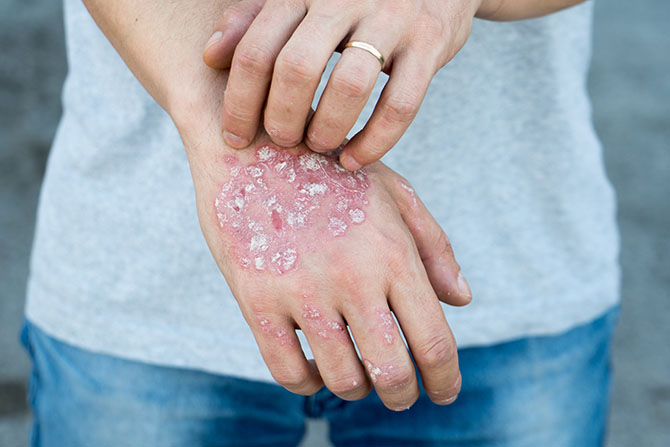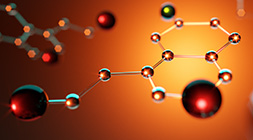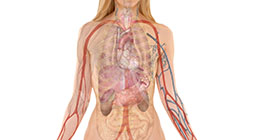
Overview
Symptoms
Causes
Prescription
Health Tips
Psoriasis is a common immune-mediated skin disease characterized by the rapid production of skin cells, leading to a congestion of cells on the skin’s surface. The normal life cycle of skin cells is 28 days, but cells produced by psoriasis mature up to a thousand times faster than those of healthy skin. Psoriasis affects men and women equally.
There are six main types of psoriasis:
Plaque: Appears as red, raised skin with scales on top. Often on the lower back, scalp, elbows and knees but can be found on any part of the body. This type is the most common, affecting about 80 percent of psoriasis cases.
Guttate: The second most common type after plaque, guttate accounts for about 10 percent of psoriasis and typically affects young adults and children. Small red lesions most commonly appear on the torso arms and legs but can also affect the face and scalp. Guttate can range from mild affecting only a very small amount of the body to severe, covering the whole body. Guttate usually lasts around two to three weeks.
Inverse: A red rash found in the folds of the body such as under breasts, armpits, behind the ear and behind the knees. Often accompanies another form of psoriasis such as plaque.
Pustular: A rare type that consists of raised white or yellow pus filled, painful blisters. Can be acute, chronic or sub acute. Fever, headache, and joint pain may also occur.
Erythrodermic: A rare form of psoriasis characterized by inflamed, painful, itchy lesions that cover large parts of the body. Usually occurs in people with plaque psoriasis.
Psoriatic Arthritis: Affects those with psoriasis. It can strike anywhere in any joint of the body, on just one or both sides. Can cause swelling in the hand and toes as well as lower back and foot pain.
More than 7 million North Americans have psoriasis, with its onset generally in the late twenties. According to The National Psoriasis Foundation, 56 million hours of productivity are lost annually in the U.S. due to psoriasis. Treatment costs US$1.6 to $3.2 billion every year.
Symptoms
Symptoms range greatly depending on the type of psoriasis. Raised patches of red with white flakes or scales appear on the torso, elbows, knees, legs, back, arms and scalp. When it is on the scalp, psoriasis promotes hair loss.
Psoriasis fluctuates between periods of inflammation and remission. It is categorized as mild, moderate or severe depending on the percentage of the body covered. If the skin becomes too badly damaged, there can be fluid loss, bacterial infection and an inability to regulate temperature.
In some people, the nails may become dull, pitted or ridged and may separate from the nail bed.
The chronic inflammation affecting those with psoriasis also puts them at an increased risk of additional health complications such as PCOS, metabolic syndrome, chronic obstructive pulmonary disease (COPD), and cancer.
There are psychological ramifications to psoriasis as well, as many people may feel shame, embarrassment, social rejection, and anger due to a lack of understanding by others.
Pregnancy complications may occur, such as low birth weight and maternal depression.
Similar to rheumatoid arthritis, psoriatic arthritis is sometimes present in those with psoriasis and is very difficult to treat and diagnose in people with subtle symptoms. It is believed that 10 to 30 percent of those with psoriasis will also develop psoriatic arthritis. It usually appears between 30 and 50 years of age. Pain, morning stiffness, swelling, and reduced range of motion are all possible symptoms, and also pitting of the nails, tiredness and redness in the eye (conjunctivitis) may occur. In severe cases, psoriatic arthritis can lead to deformity of the joints and spine.
Causes
While the cause of psoriasis is unknown, it does appear that genetics, the immune system, and environmental triggers are all contributing factors. Multiple gene variants have been found as indicators for making someone more likely to suffer psoriasis. The gene mutations may be inherited or can be triggered. Scientists estimate that around 10 percent of the population has at least one of the genes that cause a person to be predisposed to psoriasis. Of those people, two to three percent develop psoriasis.
In addition, there may be a glitch in the immune system that tells the body to produce more skin cells. With psoriasis, the immune system is often hyper-stimulated, promoting inflammatory cytokines in the skin cells. It may also be that the immune system, after a viral or bacterial infection, becomes primed to attack the skin.
Common triggers for psoriasis flare-ups are:
- A diet including excessive animal fat
- Bowel toxemia
- Heavy alcohol consumption
- Impaired liver function
- Incomplete protein digestion
- Leaky gut syndrome
- Poor diet
Other triggers are reactions to:
- Infection
- Injury
- Medication
- Nerves
- Stress
- Sunburn
- Surgery
Guttate triggers:
- Medication
- Respiratory infections
- Strep throat
- Stress
Prescription for Health
Diet is very important as food may help to soothe inflammation or increase it. Most people find some relief with cortisone drugs to reduce inflammation. Moisturizers and bath solutions provide some relief, albeit only temporary. Psoriasis sufferers will be heartened to know that some publications and unpublished studies suggest that fatty acids, like GLA, may be effective in treating psoriasis. The more serious forms of psoriasis require medication.
Diet
Keeping a diet journal is a helpful way to track foods that may cause flare ups. Also, consume a diet that emphasizes natural, whole foods such as:
- Foods high in vitamin E and vitamin C
- Fresh cold-water fishes such as salmon, halibut and mackerel
- Fresh fruit
- Healthy fats and oils
- Legumes
- Nuts and seeds
- Vegetables
These foods that often increase inflammation and potentially cause flareups should be avoided:
- Alcohol
- Caffeine
- Citrus fruits
- Nightshade vegetables (e.g. Tomatoes eggplant, potatoes)
- Processed foods
- Poor-quality, saturated, and rancid fats
- Red meat
- Dairy
Lifestyle
Psoriasis responds to sunlight. Although it is safer to avoid prolonged sun exposure in order to reduce the risk of sunburn and skin cancer, people with psoriasis will experience an improvement in their symptoms with moderate sunlight. It is also important to keep the skin moisturized.
Stress reduction, especially when paired with exercise can help to reduce symptoms. Losing excess weight is also beneficial. People who are overweight are at an increased risk of having psoriasis and are more likely to have severe symptoms.
Avoid harsh or drying skin products and scrubs. Certain chemicals, abrasive materials and fragrances can aggravate psoriasis. Look for clean personal care products at EWG’s Skin Deep Database.
Smoking will increase inflammation and the severity of symptoms so must be avoided.
Supplements
Gamma Linolenic Acid (GLA): The GLA in borage oil and evening primrose oils helps to maintain the stability and fluidity of the natural water loss barrier in the skin and prevent toxic substances from entering or irritating the skin. Optimal structure and performance of the skin is necessary in order for it to function properly. When the barrier function of the skin is defective, skin disorders and damage can result, including dry skin, eczema, sunburn, acne and psoriasis. It is essential to consume oils containing GLA because the skin cannot produce its own, often resulting in a deficiency. Clinical research has found that people who suffer from eczema have low levels of GLA. Supplementing with borage oil and evening primrose oils has been found to dramatically improve the above skin conditions.
Omega-3 fatty acids: Found in both flaxseed oil and fish oil, these potent anti-inflammatory agents work to promote remission of psoriasis symptoms. A study published in 2002 in the Journal of American College of Nutrition confirmed that many trials of fish oil in chronic inflammatory diseases such as psoriasis and psoriatic arthritis reveal significant benefit, including decreased disease activity and lowered use of anti-inflammatory drugs.
Celadrin: The esterified fatty acids present in Celadrin (a proprietary brand ointment) have pronounced anti-inflammatory effects. (The term esterified means it is stable and does not react with oxygen.) These stable fatty acids have been shown to reduce skin inflammation, while also providing a sustained emollient effect at the site of psoriasis. A double-blind, placebo-controlled study using Celadrin cream for the treatment of psoriasis was performed over a 14-day period. Patients were asked to apply the cream to the affected area twice a day. The initial severity of skin scales, patchiness, redness, dryness, cracked and raised skin were recorded. Then after 7 and 14 days, each patient visited the dermatologist who evaluated their skin. Each patient experienced a two-level improvement based on the 6-point Liker scale (0 = no improvement, 5 = significant improvement). This small pilot study found that those persons using Celadrin cream experienced a measurable improvement in their psoriasis. Celadrin also helps those with eczema, rosacea and other skin conditions by halting inflammation and healing the skin.
| Nutrient | Dosage | Action |
|---|---|---|
| Moducare sterols and sterolins | One capsule three times daily | Controls inflammation in the skin and reduces allergic reactions. Halts autoantibodies. A long-term treatment; it may take months to see results. |
| Omega-3 fatty acids DHA/EPA | Up to 13.5 g EPD and 9 g DHA | Is anti-inflammatory, promotes remission of psoriasis symptoms |
| Zinc | 25 -50 mg daily | Clears pustular psoriasis |
| Vitamin D 3 | 5000 – 10 000 IU
Doses of 35 000 IU have been given for 6 months |
Important for proper function of the skin. Also important for preventing deficiencies created when the skin cannot convert vitamin D due to damage from psoriasis. |
| Capsaicin cream | 0.075 cream applied to psoriasis several times daily | Anti-inflammatory |
| Licorice cream containing glycyrrhetinic acid | Apply to psoriasis several times daily | Anti-inflammatory; when compared to corticosteroid creams, licorice was more effective at reducing psoriasis |
| BB536 Bifidobacterium |
5–10 billion active |
Improves intestinal flora to fight bacteria, organisms essential for those taking antibiotics
Those with psoriasis may have higher levels of inflammation causing bacteria in gut |
Health Tips to Enhance Healing
- Allergies and food sensitivities are common for those with psoriasis. Ask a physician for a referral to an allergy specialist and get tested for possible triggers, including environmental allergies.
- Avoid animal meat and choose cold-water fish.
- Avoid saturated fats; they promote flare-ups of psoriasis.
- Do not take immune boosters that enhance macrophages as this can cause inflammation in the skin.
- Eliminate sugar and alcohol.
- Get outside for sun exposure. Psoriasis seems to abate during the summer months and this is thought to be a result of UV radiation.
- Stress reduction is essential. Thirty-nine percent of those with psoriasis report that stress initiates the disease.
- Try natural alternatives to corticosteroid creams such as Celadrin cream, borage oil or salves with capsaicin, licorice and chamomile.










